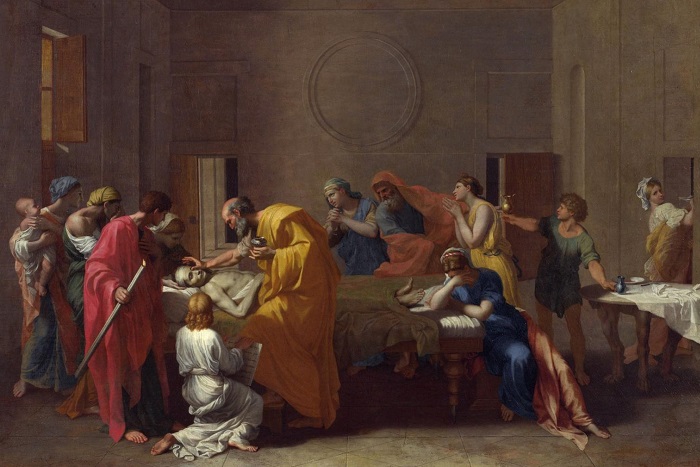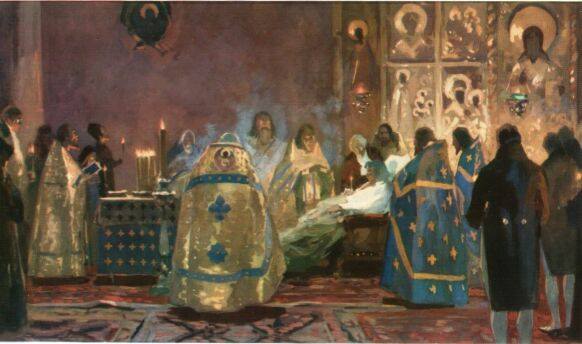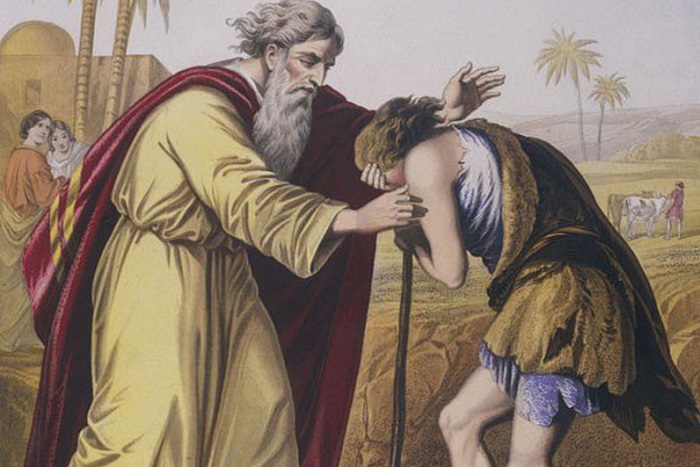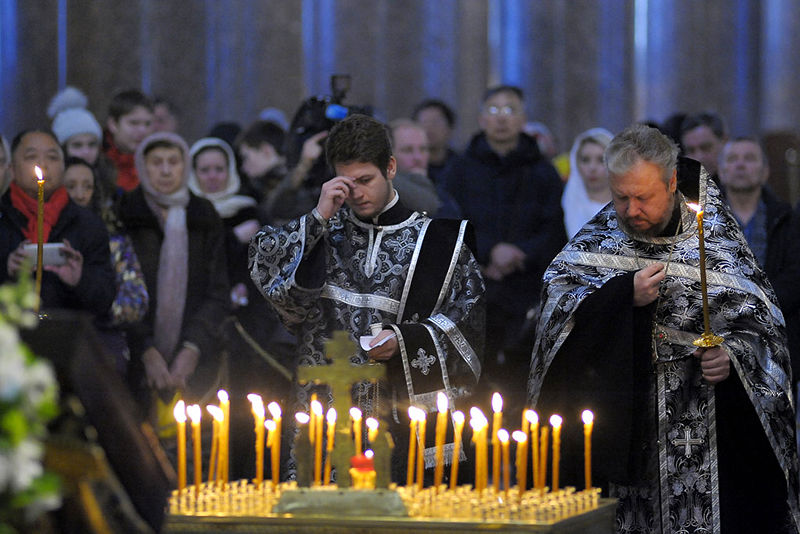
Archimandrite Spyridon (Khodanich) on the rules of the Unction.
The Sacrament of Unction is performed in all Orthodox churches during the Great Lent. However, many believers have a misguided understanding of this Sacrament. Please tell us about this Sacrament, Father! What’s its meaning?
The Sacrament of Unction or Anointing, like all other Sacraments of the Orthodox Church has its origins in the Gospel and was established by the Lord himself. We read in Chapter 6 of the Gospel according to Mark, And he called unto him the twelve, and began to send them forth by two and two; and gave them power over unclean spirits; And they went out, and preached that men should repent. And they cast out many devils, and anointed with oil many that were sick, and healed them.
We find an even more detailed description of the Sacrament of Unction in the Epistle of James, Is any sick among you? let him call for the elders of the church; and let them pray over him, anointing him with oil in the name of the Lord: And the prayer of faith shall save the sick, and the Lord shall raise him up; and if he have committed sins, they shall be forgiven him. (James 5:14-15). The apostle’s words make it clear that we’re talking about a sick person who wants to be healed from his mental and physical ailments by the Lord. That is, he wants to receive mercy from God (it is actually a play on two Greek words: elaion – oil; eleos – mercy). It is important to underscore that not only the elders of the church must practice the prayer of faith but also the sick person who prostrates before the Lord. In other words, the Heavenly Father will pour his life-giving grace into the cup of our repentance, heartfelt contrition, pure prayer and faith, depending on its size.
[T]hy faith hath made thee whole (Mark 5:34). According to your faith be it unto you. (Matthew 9:29). But let him ask in faith, nothing wavering. For he that wavereth is like a wave of the sea driven with the wind and tossed. For let not that man think that he shall receive any thing of the Lord. (James 1:6-7).
Is it true that only severely or terminally ill people can receive the Unction?
Can we determine whether the illness is severe enough or not? There are no clear guidelines that define at which stages of which illnesses to administer this Sacrament. We administer Unction to the severely ill, the terminally ill, the mentally ill (e.g., those who suffer from sorrow, depression, or despair because the most frequent reason for those illnesses are sins which the person is unaware of and hence unable to confess). We are forbidden to administer the Sacrament of Unction to children under 7 and to unconscious people.
There is a popular myth that the Sacrament of Unction is ostensibly administered only to people at their deathbed. Thus, people miss this great mercy of God… Most likely, this misconception was influenced by the medieval Western tradition, which existed prior to the Second Vatican Council. In keeping with that tradition, the Unction was administered solely to the dying, and therefore was named ‘Last Unction’ by the Catholic Church. This false perception of the Sacrament of Unction as the Last Unction made its way into our Church back in the 17th and the 18th centuries, and was even mentioned in official documents of the Church. Thanks to the efforts of Saint Philaret (Drozdov) of Moscow in the 19th century, this name was revoked because it was incompatible with the Orthodox doctrine. I’m sure there isn’t anyone nowadays who could claim to be perfectly healthy, both mentally and physically.

How often can one receive the Unction?
The answer to this question is found in the Book of Needs of Saint Peter Mogilas. He writes that we only receive unction once per one illness. If you do it more than once, it shows your lack of faith or even disbelief. We should understand that illnesses are sent to a person for his salvation. The Lord is the True Doctor of our souls and bodies and He knows best who needs what. Everyone who participates in this Sacrament with faith, receives spiritual benefit.
What is the right way to get prepared for the Unction? Does one have to confess and take communion in advance?
There are no special regulations or guidelines concerning one’s preparation for the Sacrament of Unction but, according to the established pious tradition of the Orthodox Church, the Sacrament of Unction is usually preceded by a confession and followed by a communion of the Holy Mysteries. If you are unable or too late to confess beforehand, you can confess and take communion after the Unction.
What should we do with the candles that we hold in our hands during the Sacrament of Unction? Should we preserve them in a special way?
As far as the candles, the oil, and the wheat used during the Sacrament are concerned, there aren’t any special requirements in the canons, either, but there is a certain tradition.
You can leave the candles in the church or take them home and light them up while praying. People say such horrible things about those candles that I am shocked that a Christian can believe in them. You must reject outright the rumors about the candle as a container of your illness and the harm that it could ostensibly do.
You can use the oil and the wheat for cooking. Alternatively, you can use the oil for anointing yourself or your relatives at home, applying it crosswise.
The Unction is said to be a Sacrament during which all the sins, including those you’ve forgotten to name during a confession, are forgiven. Is it true?
This is what the great elder of Optina Saint Ambrose has to say about the forgiveness of forgotten sins during the Sacrament of Unction, The power of the Sacrament of Unction lies in the fact that those sins, which a man forgot due to his infirmity, are forgiven, and as a result of that, he receives physical health, God willing. (Selected Letters in 3 volumes. Sergiev Posad, 1908. Vol. 1, p. 80).
If we delve deeper into the prayers of the Rite of the Holy Unction, we will notice that they are filled with the idea that physical health is linked to forgiveness of sins. When our Lord Jesus Christ heals the sick in the Gospel, He doesn’t say, Here, I heal you. Instead, He points at the root cause of the illness, Thy sins are forgiven.
Forgotten sins are the sins, which the person didn’t pay enough attention to and forgot due to his weakness, as opposed to the sins that you deliberately hide and don’t want to confess because you are ashamed.
Interview by Natallia Goroshkova
Translated by The Catalog of Good Deeds



